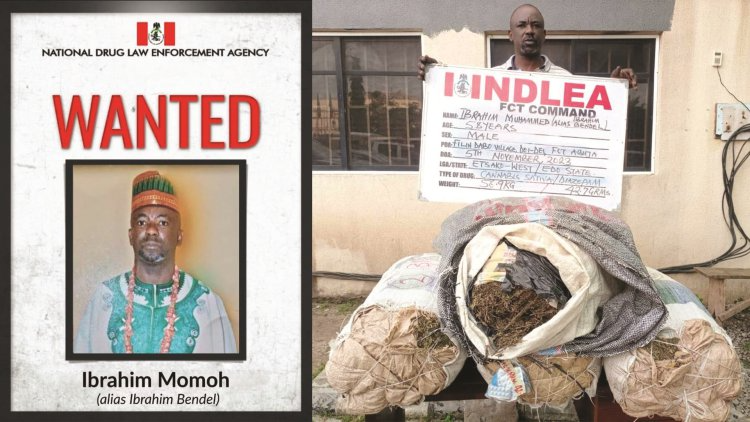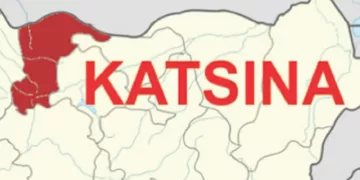Recently, the National Drug Law Enforcement Agency – NDLEA – arrested one Ibrahim Momoh, a convicted and notorious drugs and other banned substances’ dealer. His arrest, the anti-drug agency claimed, came seven years after he escaped from prison custody where he was serving a jail term for drug dealing.
The agency also said that Momoh, popularly known as Ibrahim Bendel, was re-arrested early this month during a raid on his hideout at Filin Dabo, Dei-Dei area of the Nigerian capital city, Abuja. Found in his possession were 56.9kgs of cannabis sativa and 42.7 grams of Diazepams.
Records indicate that Momoh was first arrested in 2014 with cannabis sativa weighing 385.1kgs, prosecuted, convicted and sentenced to seven and a half years in prison. He escaped from Kuje prison custody in May, 2016.
It is worrisome, in our view, that Momoh operates a warehouse where cannabis and other substances are stocked in Dei-dei, a community in the out-skirts of Abuja. Even more disturbing is the number of lives destroyed by Momoh’s illicit trade in banned substances.
Nigeria’s statistics of drug abuse is startling. It is estimated that between 30 to 35 million Nigerians spend approximately $15,000 and $30,000 annually on psychotropic substances and alcoholic beverages, respectively. As should be expected, the abuse of drugs and other substances has led to a steep rise in crime.
In a 2018 report titled Drug Use in Nigeria, the National Bureau of Statistics said that about 14.3 million Nigerians, mostly within the ages of 15 and 64, were involved in drug abuse with cannabis sativa being the most widely used substance followed by tramadol, codeine or morphine and cough syrups containing codeine or dextromethorphan.
Initially, when the drug issue came into national space, there wasn’t much concern because the argument was that Nigeria was just a transit country. Soon after, the consumption of cannabis rose to a disturbing level with heroin and cocaine coming into the dangerous mix.
Nigeria, unfortunately, has continued on that downward slope of drug-infested countries to the point that she is now not just a heavy consumer of banned substances but a cultivator of cannabis and produces highly addictive and potent drugs, such as methamphetamine.
The situation is getting complex by the day as youths now abuse substances like methylated spirit, glue, nail polish, paint thinner, fermented urine, heads of matches, and laughing gas, also known as nitrous oxide- an odourless, colourless gas used by doctors in medical and dental surgery.
This exposure to drugs, especially among the youths, has further weakened the nation’s frail value system and has exacerbated criminal activities including kidnapping, rape and the senseless killings that permeates different parts of the country.
We are not unaware of the fact that there is pain and suffering in the country both of which often drive youths to drugs in their bid to assuage their frustrations, albeit, through the wrong process. But it must be stated that drugs are not and cannot be an escape from the hopelessness which most of the nation’s youths find themselves in.
Indeed, the downside of drug and substance abuse is enormous including the fact that it leads to mental disorders, addiction and other hardships and, in most cases, death. There is, therefore, the urgent need for critical stakeholders to support the government in its war against drug abuse as being effectively waged by the NDLEA.
While we laud the NDLEA for rearresting Momoh, the Agency must ensure that it pulls all plugs in the effort to make him face the full wrath of the law, this time round.
But most importantly, NDLEA must move beyond his recapture to interrogating the circumstances surrounding his escape from the Kuje Prison in the first place. How was it possible for a criminal of his stature to so easily escape from the prison and have the boldness to return to the illicit trade for which he was convicted? It is clear that Momoh has not learnt any lesson from his previous conviction.
Curiously, the NDLEA’s statement about the raid and subsequent arrest of Momoh was silent on the circumstances surrounding his escape. The Nigerian public needs to know. There has to be a full disclosure.
Tellingly, Momoh and his partners in crimes are like cancer cells in the society. No effort ought to be spared in removing them before they fester. To the extent that illicit drugs have done and have continue to do irreparable damage to the nation, it won’t be out of place to recommend death penalty for those trading in illicit drugs.
It will, also, not be a bad idea if the criminals, when arrested, are compelled to consume all the drugs found in their possession. That way they may understand the harm they are causing to the society. In our considered opinion, that way, justice would have been served.











